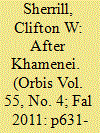| Srl | Item |
| 1 |
ID:
106886


|
|
|
|
|
| Publication |
2011.
|
| Summary/Abstract |
Since succeeding the Supreme Leader Ayatollah Khomeini in 1989, Ali Khamenei has striven to make himself indispensible to the fate of Islamic fundamentalism in Iran. However, the measures Khamenei has taken to secure his power have left his succession in doubt, with no consensus heir. The lack of clear successors among the clergy, weakness of the government institutions, and concerns about regime strength could lead to instability and the potential for an Islamic Revolution Guard Corps coup.
|
|
|
|
|
|
|
|
|
|
|
|
|
|
|
|
| 2 |
ID:
133624


|
|
|
|
|
| Publication |
2014.
|
| Summary/Abstract |
Hassan Rouhani's victory in the June 2013 Iranian presidential election surprised many who expected that the Islamic regime's supreme leader, Ayatollah Ali Khamenei, would ensure a strong conservative candidate would win. With most candidates - including former President Ali Hashemi Rafsanjani and Esfandiar Mashaie, Mahmoud Ahmadinejad's preferred successor - disqualified by the Guardian Council, the approved slate consisted of eight men. Two would subsequently withdraw, leaving a choice among six candidates on election day. Of these, Rouhani was the only candidate who could be described as a moderate. Although it is not surprising that Iranian voters would support Rouhani in this field, the 2009 election had convinced many that the actual votes were irrelevant. Having overseen the consolidation of conservative control of Iran's elective offices, and having warned repeatedly that a "velvet revolution" posed the greatest threat to the regime, Ayatollah Khamenei seemed certain to engineer another conservative win. Therefore, the official announcement that Rouhani had secured an absolute majority of the votes, more than three times the total of any other candidate, to win the election without even a runoff was stunning.
|
|
|
|
|
|
|
|
|
|
|
|
|
|
|
|
| 3 |
ID:
111126


|
|
|
|
|
| Publication |
2012.
|
| Summary/Abstract |
Understanding why the Iranian regime wants to possess nuclear weapons is essential to formulating the best policy to prevent (or perhaps to simply manage) the emergence of a nuclear-armed Iran. Three general theories-realism, liberalism, and constructivism-provide a framework for looking at Iran's nuclear motivations. However, contrary to many analyses, the regime's desire to possess nuclear arms stems not from neorealist defensive concerns, but rather from offensive goals driven by domestic politics. The use of extremist Islamism by the Iranian regime to justify its autocratic rule is the primary motivating factor. Accordingly, the outlook for diplomatically addressing the Iranian regime's nuclear aspirations appears dim.
|
|
|
|
|
|
|
|
|
|
|
|
|
|
|
|